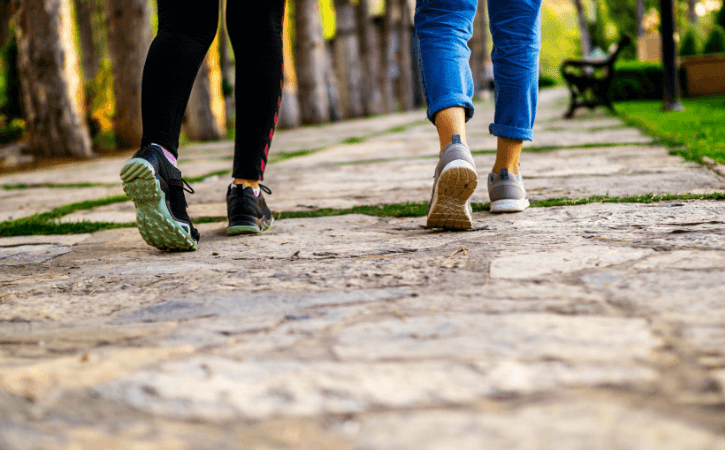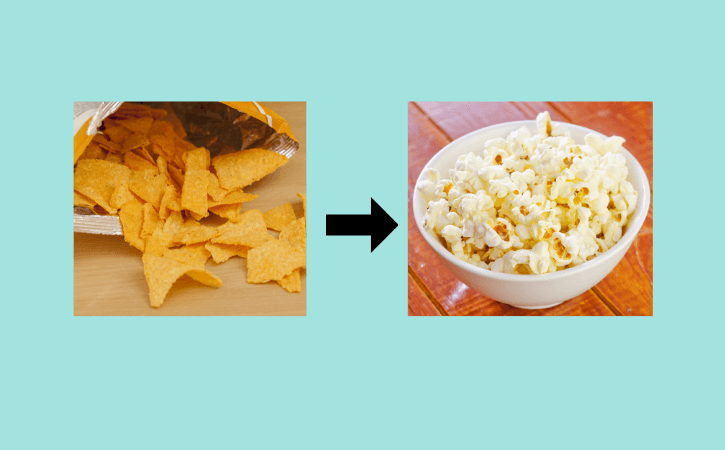

Every week, I have multiple conversations about the benefits of doing the simple things well, consistently overtime.
In essence, the sum of all the small things you do on a daily basis will make the biggest impact on your health in the long run. Much more so than the big things you do, not so often.
There are so many things that can make a big difference when it comes to your health.
- Eating plenty of fruit & vegetables
- Exercising regularly
- Managing your stress levels
- Enjoying your leisure time, to name just a few...
But if I were to choose just three simple swaps that could make a real difference to your health and change your life, this is what they would be.
Simply put, going from low to a higher daily activity or steps is one of the most underrated yet impactful ways to improve your health.
Why is daily activity or steps so important?
Without sounding overly scientific, the Journal of the American Medical Association in 2021 found in a large cohort study that participants taking more than 7,000 steps per day, when compared to participants doing lower than 7,000 steps per day, had a 50-70% lower risk of mortality.
This means that your life expectancy significantly improves by swapping out low activity for a higher level of activity. How cool is that?
Lace my trainers up, I'm going for a walk!
Daily activity has many more benefits than just improving your life expectancy.
Daily steps will:
- Improve your general wellbeing
- Combat stress & lift your mood
- Burn calories
- Improve your metabolism
How can I increase my activity?
You can increase your activity by planning some walks into your days or exercising regularly. This is the gold standard. But fear not, if you can't physically get out of your house.
You can also take work calls whilst walking around the house, gardening, doing house work and even playing with your children or grandchildren. The list goes on.
All movement counts, when it comes to increasing your daily activity. So, please don't feel bad if you can't go for a walk outside today.

Food swaps are a neat way of substituting something you really love - which typically contain high amounts of calories or can be deemed to be 'unhealthy' - with something that is similar but lower in calories and deemed to be a healthier option.
You can achieve this in two ways:
1) Substituting something unhealthy for something deemed to be more healthy.
For example, swapping a donut for a piece of fruit.
2) Or substituting it 'like for like' to a healthier and lower calorie version.
For example, swapping a bag of crisps for a lower calorie bag of crisps. See below:
1 large bag of Doritos = 918 calories
1 large bag of Proper Chips = 368 calories
A saving of almost two thirds of the calories!
There are so many options when it comes to food swaps. You can readily find alternatives to almost all of the foods you eat when you know how.
To find out more tips on food swaps join our Food Group on Facebook for free here.

Swapping out poor quality sleep for high quality sleep is such a powerful tool to improve your health. I could write a book about the importance of sleep!
But, here is just one potent reason why improving sleep quality matters.
It is incredibly important when managing your weight.
Let me ask you this...
Have you ever slept terribly and found yourself eating everything in sight the next day?
The reason why this happens is because you are tired and your ability to make good decisions about your nutrition goes out the window.
You go from pass me the salad, to pass me the biscuits!
From a physiological standpoint too, your body's ability to feel full is reduced so you find yourself not only reaching for poorer food choices but also eating more of it too. Double jeopardy!
So, by having a few nights of poor-quality sleep, can really impact your ability to manage your nutrition choices and therefore weight.
- Take time to unwind at night, without working or writing emails. Go for a hot bath, stretch/ foam roll, read a book. All of these things can improve your deep sleep and help you fall asleep faster.
- Reduce light exposure before sleep. Light exposure can interrupt your body's natural circadian rhythm. Having your lights or the TV on tells your body that it is still daylight and that is not conducive to a good night's sleep. If you can dim your lights or switch off your lights completely, an hour or two before bed, this will go a long way to help you to sleep better.
- Having a cold and airy room. Your body likes a cold room at night, so open those windows and allow some fresh air in to ventilate the room. You will sleep better for it.

Give these health swaps a try and let me know how it goes? Remember, these tips are simple not easy. So please reach out if you are wanting to change but need some support. We are happy to help.
- Coach Alex